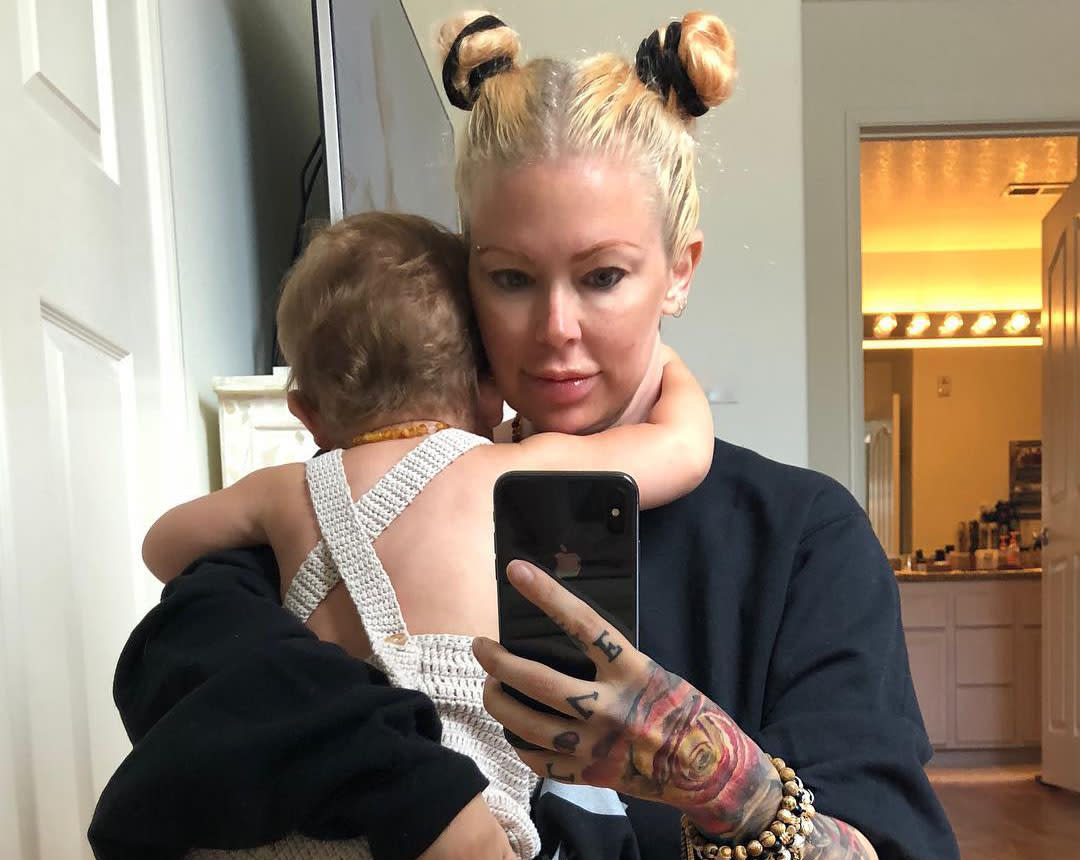The after-baby picture Jenna Jameson nearly 'chickened out on' posting

Since giving birth to her third child, daughter Batel, in April, former adult-film star Jenna Jameson has been making a name for herself by sharing Instagram posts about her postpartum weight-loss journey. On Monday, Jameson shared before and after pictures of herself that show just how far she’s come.
“Ugh. I almost chickened out on posting this before image of me,” she captioned two photos of herself. “This is me at my heaviest, probably around 187 maybe more. More than likely more. I asked my hubby to shoot an elbow up pic for a pro breastfeeding pic for IG. I don’t even know what to say, other than I’m so sorry to my body.”
Jameson recently revealed on Instagram that her current weight is about 125 pounds, which she attributes to a combination of the keto diet and intermittent fasting.
A post shared by Jenna Jameson (@jennacantlose) on Sep 2, 2018 at 11:59am PDT
Jameson’s apology to her “before” body is poignant, especially given that her daughter looks pretty young in the photo. Clearly women do and should gain weight during pregnancy, and that weight doesn’t (and shouldn’t) magically disappear. But at what point in the postpartum weight-loss journey might excess weight become a health concern?
Postpartum weight loss can vary tremendously from person to person and depends on several factors, women’s health expert Jennifer Wider, MD, tells Yahoo Lifestyle. Those factors, she says, may include “if a woman is breastfeeding, when she is advised to start exercising (this can depend on the type of delivery), how much weight she gained during the pregnancy, and what her lifestyle habits were before and during the pregnancy.”
“For many women, it can take between six to 12 months or more,” Wider says, adding that most health professionals recommend losing the weight gradually, at “one to two pounds per week.”
Weight loss is pretty rapid in the immediate postpartum period, though. “In the initial period shortly after the baby is delivered, the weight of the fetus, placenta, and amniotic fluid is about 13 pounds — that’s gone,” Christine Greves, MD, an ob-gyn at the Winnie Palmer Hospital for Women and Babies in Orlando, tells Yahoo Lifestyle. “After that, within the first six-week period, the uterus starts to contract, and all of that extra fluid that you held on to during pregnancy normalizes. That can contribute to another five to 15 pounds of weight loss.” But after that, women tend to lose weight at a slower rate, Greves says.
Weight gain is a normal and natural part of pregnancy and “women’s bodies are designed to give birth,” Wider says, “but that doesn’t mean the extra postpartum weight isn’t hard on the body.” Carrying extra weight for a long period of time can put stress on a woman’s joints and cause backaches, fatigue, and shortness of breath, she says.
Again, carrying around some extra weight in the weeks and months after giving birth is normal. But if a woman has trouble losing weight after a certain point, it can lead to “poor self-esteem, anxiety, and possibly depression,” Wider says. (Jameson has said she struggled with her mental health during her weight loss journey too.)
If you’re having trouble losing postpartum weight after several months and the excess weight is causing you emotional or physical distress, it’s a good idea to check in with your doctor, Greves says. There could be a hormonal issue at play, or for women who had gestational diabetes, she says, “You’re at an increased risk of getting it later in life,” and both of these issues can make it difficult to lose the weight.
Finally, she says, just do your best at trying to slowly shed pounds — “I know it’s hard, though.”
Read more from Yahoo Lifestyle:
Venus Williams expands fashion label into plus-size: ‘Representation matters’
‘You can be unhappy with it or thank God for what you have’: Curvy influencer shares key to success
Follow us on Instagram, Facebook, and Twitter for nonstop inspiration delivered fresh to your feed, every day.
